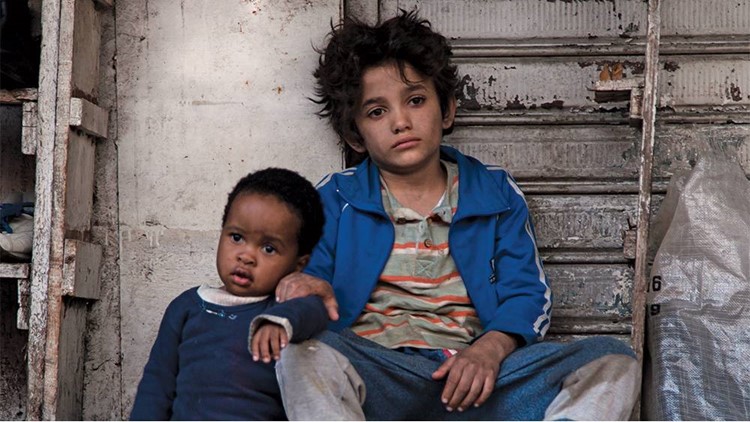It's a common, if playful, thing for parents to threaten their kids with this line: "Be good or I'll disown you." But what if the kid wanted to disown his parents?
Welcome to the premise for "Capernaum", the potent new foreign-language feature from Nadine Labaki. A movie that waltzes into the darkest areas of humanity and manages to be as hopeful as it is powerful.
In another director's hands, the movie would have been either overly melodramatic, unusually distant or more commercially digestible for moviegoers. But Labaki, working from a script she wrote with Jihad Hojeily and Michell Keserwany, delivers a film with adolescent angst that carries an earnest touch.
Young Zain (Zain Al Rafeea, keep an eye on this kid) is one of several — who knows how many — kids of his decrepit parents. He lives in a crummy apartment building in Beirut, Lebanon, tending to his older sister, Sahar (Haita Izzam), whom he loves dearly, and the rest of his many siblings. How old is Zain? Who knows? Don't ask his parents, because they don't have a birth certificate for any of their children.
When Zain's parents dip to desperate measures involving Sahar to make ends meet, the young kid commits a crime, and runs away. Stranded yet not lost in the streets of one of the most dangerous cities in the world, Zain befriends a young woman. Rahil (Yordanos Shiferaw) at a theme park, and becomes friends with her toddler, Yonas (Bolowatife Treasure Bankole).
It is here that "Capernaum" truly ascends to a darkly poignant road movie, as a series of unfortunate circumstances place Zain and Yonas on the streets, feuding for themselves. Whether it's begging for food, trying to stay warm, or simply staying alive, these two kids are a thrill to watch. When you are stripped of all the securities and comforts of life, the human spirit takes over, providing a chance at survival or immediate tragedy.
Zain and Yonas' story evolves, building to one of the toughest and most emotional scenes I can recall in recent cinematic history. There's more to their story, but I'd rather leave that for you to discover in the theater instead of via an article. There are jewels inside this film; dark and desolate ones.
The cast is largely unknown, and the obscurity of their names adds juice to their performances. If you knew these faces, the weight of the acting would be hampered. By not knowing them from anything else, this is an introduction for many of them including Rafeea, their performances are loaded with conviction. This transports the viewer to Beirut immediately, because you never question the ability of these brave young performers.
Labaki's filmmaking touch here is simplistic yet personal, conveying the sadness of a young boy dealt the worst of hands and trying to make the most of a life doomed from conception. She never forgets to let us hear the sound of the city that entraps Zain, which gives us a direct line to the chaos in his and so many others' lives.
There's an emotional sweep to the story that manages to carry the viewer through some of the rougher patches of the movie. Once again, the filmmaker's touch is light on its feet and deft when it comes to illustrating a situation without depressing the viewer. She wants you to focus on the Zains of the world and their hardships, but keeps your attention.
The result is one of the more quietly powerful films of the year. "Capernaum" hits hardest when it's set to a breakneck pace in the slums of Beirut, showing us the depraved souls who must withstand the torment of their supposed caretakers. You'll want to smack Zain's parents, and buy the kid a meal. The film aims to dig deep, and does so effortlessly. The imagery is relentless, holding you in its grasp for the entire two-hour-plus running time.
When I left the film, I went home and hugged my kid. We hung out and did a few things. When you see a film where the parenting is atrocious, you wish to be better at home in real life.
In an uncomfortable yet true way, this film reminded me of last year's "Loveless".
"Capernaum" is about the end of innocence before the age of 10, when kids must become adults because their parents refuse to. Herbert Spencer, a British philosopher, said it best when he coined the phrase, "survival of the fittest." He talked about the preservation of favored races in the struggle for life.
For Zain and young Yonas on the streets of Beirut, the struggle is real.



